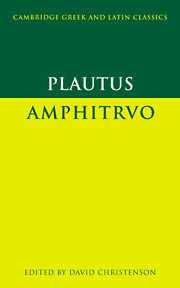Transmission of the text
from Introduction
Published online by Cambridge University Press: 05 March 2013
Summary
For some time after his death, the scripts of Plautus’ plays existed in a highly fluid state in which they were no doubt altered by producers to meet the perceived demands of revival performances. Disputes as to which plays were genuinely Plautine seem to have arisen already in the second century bc, when editors first begin to work on Roman texts after the Alexandrian fashion. The critical authority of Varro eventually prevailed although Gellius NA 3.1.11 knew of 30 plays circulating under Plautus’ name in the second century ad, we presume that the twenty-one we possess today in differing states of completeness are those judged to be genuine by Varro. Am. is represented in only one of the two strands of the ancient recension, the Palatine, whose oldest minuscule MSS B, C, D are dated to the tenth/eleventh centuries (C does not include Am.). The most important MSS for establishing a text of Am. are:
B Palatinus Vaticanus (1615), tenth/eleventh century
D Vaticanus (3870), tenth/eleventh century
E Ambrosianus (I 257 inf.), twelfth century
J Londinensis (BL, Reg. 15 C XI), twelfth century
B has long been acknowledged to be the most reliable member of the Palatine family, which is designated P (= the agreement of B, C, D for most plays); in addition to its generally superior readings, it provides important corrections in multiple hands, which are sometimes right against the entire tradition. J has been described as an ‘enigma’ in that it sometimes presents readings that agree only with B or, for some plays, A, the Ambrosian palimpsest (the other main branch of the tradition). Besides the MSS, we receive extensive testimony for Plautus’ text from ancient grammarians, especially Nonius Marcellus (fourth century ad); though much is quoted hastily from memory, the grammarians sometimes give valuable readings.
- Type
- Chapter
- Information
- Plautus: Amphitruo , pp. 75 - 80Publisher: Cambridge University PressPrint publication year: 2000



